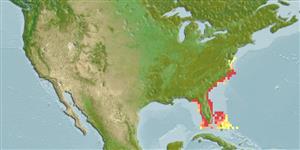>
Cyprinodontiformes (Rivulines, killifishes and live bearers) >
Fundulidae (Topminnows and killifishes)
Etymology: Fundulus: Latin, fundus = bottom; a peculiar name for a topminnow, coined for a bottom species of Atlantic coast being "the abode of the fundulus mudfish" (Ref. 45335).
More on authors: Goode & Bean.
Environment: milieu / climate zone / depth range / distribution range
Ekologi
marina; sötvatten; brackvatten bentopelagisk; ej vandrande; djupintervall 0 - ? m. Temperate; 15°C - 26°C (Ref. 2059); 40°N - 24°N, 85°W - 74°W
Western Atlantic: Chesapeake Bay to southern Florida (including Keys) in USA and northeastern Gulf of Mexico.
Size / Vikt / Age
Maturity: Lm ? range ? - ? cm
Max length : 8.0 cm TL hane/ej könsbestämd; (Ref. 27139)
Occurs mainly in grassy backwaters and brackish bays, not along open beaches. Also found in fresh water (Ref. 7251). Omnivorous and feeds on small fishes, insects, small crustaceans, plants, annelid worms and mollusks (Ref. 93252). Not a seasonal killifish. Is difficult to maintain in aquarium (Ref. 27139).
Life cycle and mating behavior
Könsmognad | Reproduktion | Lek | Ägg | Fecundity | Larver
Distinct pairing during breeding (Ref. 205). Oviparous (Ref. 205). Mature males during the breeding season are dark green, with pearly spots sometimes arranged vertically, these features having similarities with males of F. heteroclitus (Ref. 205). Females are brownish olive in color, with black dots above and black short narrow bars on the body (Ref. 205). Eggs are capable of surviving out of water for long periods of time (Ref. 45994).
Huber, J.H., 1996. Killi-Data 1996. Updated checklist of taxonomic names, collecting localities and bibliographic references of oviparous Cyprinodont fishes (Atherinomorpha, Pisces). Société Française d'Ichtyologie, Muséum National d'Histoire Naturelle, Paris, France, 399 p. (Ref. 27139)
IUCN Red List Status (Ref. 130435)
Threat to humans
Harmless
Human uses
Akvarium: Kommersiell
Ytterligare information
Age/SizeTillväxtLength-weightLength-lengthLength-frequenciesMorfometriMorfologiLarverLarvdynamikRekryteringAbundansBRUVS
referenserVattenbrukVattenbruksprofilAvelslinjerGenetikElectrophoresesÄrftlighetSjukdomarBehandlingNutrientsMass conversion
MedarbetareBilderStamps, Coins Misc.LjudCiguateraHastighetSimsättGälytaOtolithsHjärnstorlekSyn
Verktyg
Special reports
Download XML
Internet-källor
Estimates based on models
Preferred temperature (Ref.
123201): 21.1 - 26.9, mean 25.5 °C (based on 105 cells).
Phylogenetic diversity index (Ref.
82804): PD
50 = 0.5000 [Uniqueness, from 0.5 = low to 2.0 = high].
Bayesian length-weight: a=0.00741 (0.00380 - 0.01446), b=3.15 (2.98 - 3.32), in cm total length, based on LWR estimates for this species & Genus-body shape (Ref.
93245).
Trofisk nivå (Ref.
69278): 3.2 ±0.2 se; based on size and trophs of closest relatives
Resiliens (Ref.
120179): Hög, lägsta populationsfördubblingstid mindre än 15 månader (Preliminary K or Fecundity.).
Fishing Vulnerability (Ref.
59153): Low vulnerability (10 of 100).
Nutrients (Ref.
124155): Calcium = 143 [68, 358] mg/100g; Iron = 0.523 [0.248, 1.058] mg/100g; Protein = 17.1 [15.7, 18.6] %; Omega3 = 0.398 [0.153, 1.021] g/100g; Selenium = 5.25 [1.77, 14.88] μg/100g; VitaminA = 32.1 [8.0, 129.0] μg/100g; Zinc = 1.51 [0.91, 2.41] mg/100g (wet weight);
